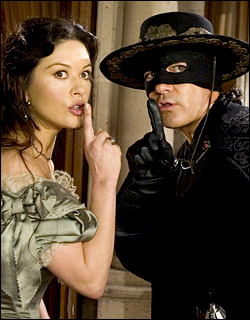 Image via Yahoo Movies
Image via Yahoo Movies I woke up this morning thinking inexplicably of the word Alejandra. I do not even know what it means. But here is what I came up with:
Alejandra--what the Spanish
language does for humble syllables
No English word would flow thus,
musically, and above all else emotionally
Alejandra--putting emphasis
on that middle soft yet gutteral
Preceded by two quiet dark eyes
and ending in a small smart foot
Alejandra--a Spanish musical
performed on the stage of four small syllables.
Addendum. So, I googled Alejandra and was startled and a little disappointed to find it was a girl's name. I was imagining it was a town's name, or some feature of landscape like a gully or canyon. Disappointed because it makes my human analogies in lines 7-8 less inventive than I thought they were. But maybe that also makes them more pertinent? I think I got the word somewhere out of the movie
The Mask of Zorro
.
Further addendum. Hmmm reading about
Zorro, I see that the main character is Alejan
dro, a guy. It is funny how memory works. It is sometimes annoying how memory works (or doesn't work). But unpredictable elements of memory can be great fun when they surface as poetry.
















